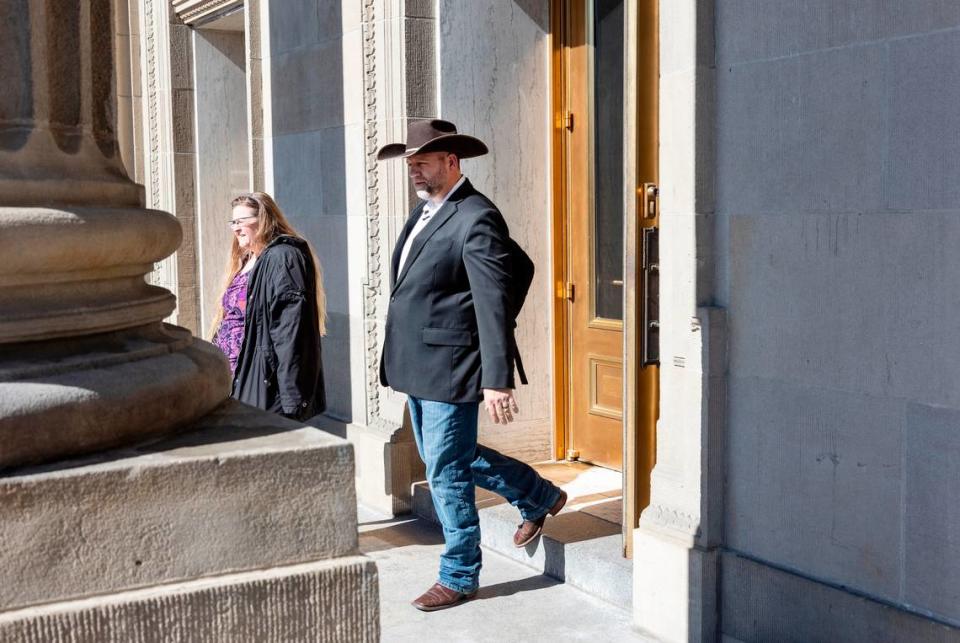‘I owe St. Luke’s nothing’: Jury ordered Bundy to pay millions. Will plaintiffs see a dime?
- Oops!Something went wrong.Please try again later.
An Ada County jury has ruled that far-right activist Ammon Bundy and his associate, Diego Rodriguez, owe a combined $52.5 million in damages to St. Luke’s Health System and other plaintiffs in a defamation case that just ended.
So what happens now? Will the plaintiffs actually see any money? How likely is it that Bundy and Rodriguez will pay, considering both refused to show up in court or participate in the proceedings, and lost the case by default as a result?
St. Luke’s attorney Erik Stidham told the Idaho Statesman that the health system “will be pursuing its legal rights to collect” the damages.
“If Mr. Bundy is unwilling to pay his obligation, St. Luke’s will pursue the appropriate actions under the law,” Stidham said.
The health system, its CEO and two medical professionals sued Bundy, Rodriguez and their business entities for defamation after Bundy-led activists protested a child welfare case involving Rodriguez’s 10-month-old grandchild. The defendants posted multiple defamatory lies online about the hospital system, its employees and the reasons the baby was taken into custody, according to court records.
Bundy’s People’s Rights Network and his campaign for Idaho governor, as well as Rodriguez’s Freedom Man website and political action committee, were defendants in addition to the two men.
The jury this week ordered all defendants to pay millions to the plaintiffs, with compensatory damages totaling $26.5 million and punitive damages totaling $26 million.
Bundy remains defiant
In most civil cases, plaintiffs and defendants will come to an agreement on a payment plan. For example, someone could agree to pay a certain amount of money every month for a certain amount of years.
But Bundy said he has no intention of handing over anything. When asked about paying the damages determined by the jury, Bundy told the Idaho Statesman, “I owe St. Luke’s nothing,” and said he has no plans to abide by the court decision.
“I plan on doing what I have been doing,” Bundy said. “Providing for my family and living life as much as normal.”
Bundy said he doesn’t plan to appeal the decision because he doesn’t “believe the court will bring justice to this.”
He also said he has no plans to organize protests at this time.
“I try to only assemble people when rights have been infringed upon and need to be restored. No rights have been taken by these 12 people making a decision,” he said.
Rodriguez did not respond to the Statesman’s questions about his plans for handling the jury’s decision.

Collecting on damages
There are several ways for plaintiffs, who essentially become creditors, to seek compensation if a party is unwilling to pay civil damages.
Stidham said the plaintiffs are considering overturning fraudulent conveyances, placing liens on properties and attempting to force Bundy to disclose all of his assets, among other things.
Miguel Soto, a professor at the University of California, Berkeley, School of Law and staff attorney at the Consumer Justice Clinic — where he assists people facing debt collection — talked to the Statesman about common ways of forcing defendants to pay.
Liens — A judgment lien can be placed on real estate property, preventing someone owing money from selling or refinancing their home and property until outstanding obligations have been paid.
In early December, Bundy paid $5,404 to remove a lien on his home that had been placed through a judge’s Writ of Execution, a result of Bundy’s failure to pay St. Luke’s attorney fees after he was ordered to do so for not showing up in court.
Bundy later said he sold his home.
Unwinding fraudulent conveyances — A fraudulent conveyance is “the transfer (conveyance) of title to real property for the express purpose of putting it beyond the reach of a known creditor,” according to the Cornell Legal Information Institute. If a creditor can show the court that this type of fraud occurred, the court can have the transfer voided.
St. Luke’s said in previous filings that Bundy was setting up shell corporations and transferring assets into them to avoid damages, something Bundy denied.
Garnishments — In Idaho, a person who owes money through a civil case can have part of their income garnished, taken either through employee wages or via a bank account.
State law says that garnishment “can’t exceed the lesser of: 25% of your disposable earnings for that week or the amount by which your disposable earnings for that week surpasses 30 times the federal minimum hourly wage,” according to legal advice website Nolo.
Asset seizure — A creditor can go to court to obtain a writ of execution directing the county sheriff to seize a debtor’s assets, including money in bank accounts.
Law enforcement may seize physical assets and auction them off, with the proceeds going to the creditor.
“It’s rarely a good idea because it’s an expensive process to pay the sheriff,” Soto said. “And then often there’s an auction company involved and auction prices are lower. So unless it’s like a classic car, I don’t really see much of that happening.”
Seized assets can include nonphysical assets as well, such as shares and interest in a company, streaming royalties or a copyright.
Certain funds cannot be seized in Idaho, including money received through disability benefits, veterans benefits and workers’ compensation. Some physical items are protected from seizure as well, including furniture, family heirlooms and a primary home. Among other exceptions, people owing money may keep one car not exceeding $10,000 in value and one firearm not exceeding $1,500 in value.

